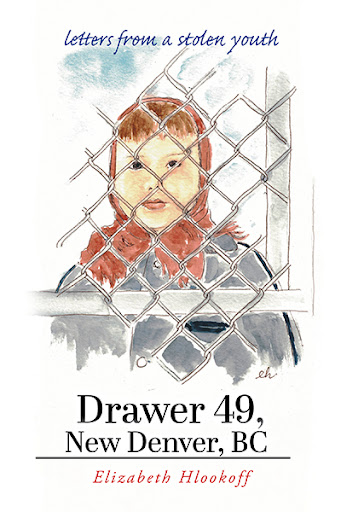A woman who spent four and a half years as a child at the New Denver residential school for Sons of Freedom Doukhobor children has published a memoir.
Elizabeth Hlookoff was taken from her family in Grand Forks by the BC government in 1954 at age seven because they were not sending her to school.
She was among about 200 children seized and sent to New Denver between 1953 and 1959, based on the government’s belief that it could end longstanding conflicts with the Sons of Freedom by forcibly educating their children.
In 2004, the provincial government issued a “statement of regret” for its actions, but it has been reluctant to formally apologize.
Drawer 49: Letters from a Stolen Youth is presented from the perspective of Hlookoff’s childhood self. It was written about six years ago but only recently self-published.
“I’ve written all my life and it was probably therapy,” Hlookoff says. “I had all these stories and they kept coming up so I wrote them down.”
Hlookoff says her brother and sons read the manuscript, but it wasn’t until she chatted with her physiotherapist, Fred Samorodin, that she considered publishing it. Samorodin visited the New Denver school as a child because some of his cousins were there.
When Hlookoff told him she had written a memoir, he wanted to read it and suggested she publish it. Although she wasn’t interested initially, he told her about other survivors of the school and some of the abuses they endured.
“Because I wasn’t part of the community all of these years, I didn’t know that,” she says. “I didn’t know the trauma inflicted on people. I was lucky. Looking back, I’m sure there are effects but there was nothing as drastic as what Fred told me about.”
Hlookoff says the book describes her thoughts from the day that she was removed from her family, taken before a government official, and sent to New Denver.
“The police cars coming. The trip to New Denver and how I felt about everything as a child and trying to adjust because I didn’t know anybody there. It was a big adjustment. It’s all the little stories of my impressions.”
While many children came with relatives, Hlookoff was one only a few children from the Boundary and was sent with a boy she didn’t know.
Hlookoff says for all of the children in the school, “there was such longing all the time.”
Although initially they were able to visit with their parents on the ground and have physical contact, albeit infrequently, later a chain link fence was erected and it was through that barrier that they saw their parents.
“There were no hugs. There was finger touching and trying to kiss through the fence. You didn’t get that from the staff. You didn’t get hugs. It was a real lack of love and nurturing.”
Hlookoff says as a child, she started to think that “white people were the enemy.” Many Japanese-Canadians, who were interned in New Denver a decade earlier, still lived there and were kind to them.
“But when I look back, I started to distrust white people because they were the ones doing this. Even though we were white.”
In fact, Hlookoff thinks the fact that they were white was the reason their experience wasn’t even worse. That and the fact that their supervisors were people from the community, rather than a church.
Still, “a lot of them didn’t like Sons of Freedom Doukhobors and it’s understandable. It’s not understandable that they didn’t like the kids by proxy. You had that sense of being the other.”
Hlookoff says she did experience kindness in New Denver. A matron wanted to adopt her. She got along well with the summer interns, people straight out of school who were hired to do things like teach swimming lessons. “They were more like us and didn’t dislike us.”
The book’s title refers to the box number where she received letters. Although the title and subject matter are reminiscent of an earlier memoir, Girl 85, by Helen Chernoff Freeman, Hlookoff says it was not a direct inspiration and the books are quite different.
She says that once she left the New Denver school, she had another adjustment to make. She attended high school in Grand Forks and was friends with orthodox Doukhobor kids.
However, in 1962 her family joined a trek to Agassiz, where many Sons of Freedom had been placed in a specially-built prison. Hlookoff finished high school in the Lower Mainland, after making a deal with the principal to take Grade 11 and 12 in the same year.
She attended university, married, and held many different jobs.
“I never was in the Doukhobor community. Until recently I had lost touch with what what was going on. Now through Facebook I’ve connected with people.”
Hlookoff, who lives in Maple Ridge, says her memoir is not an historical document, but “really trying to show what happens to a child. Children aren’t in control of their lives. When grown-ups make decisions, whether it’s parents or the government, what a child goes through. It’s just a child telling what happened.”
Her book can be ordered from Friesen Press and will be available locally.
You can listen to the whole interview below.






